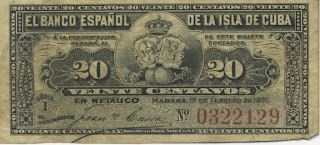I'll try and do it in little chunks so as its more accessible. first we'll start with a bit about the country and then the notes - oldest first.
The Republic of Cuba is a large island south of Florida in the united states, with its capital city Havana synonymous with, communism, cigars, and Salsa (and other dances) not necessarily in that order. the first European to discover Cuba was Christopher Columbus in 1492 and Cuba became a Spanish colony from then until the Spanish-American war in 1898. Full independence came in 1902. Fidel Castro led his rebel army to victory in 1959 and the communist state was born. In the early 1990's the Soviet Union collapsed and their backing fr Cuba disappeared and adding to the problem the illegal american blockade of Cuba caused what Cubans called the Special period, which was a period of severe hardship for Cubans. Out of the special period, the Cubans changed from the soviet way of massive state farms to the development of smaller organic and Permaculture farms to feed the population.
on February 2008, Fidel Castro resigned from the presidency and his Brother, Raul was elected president one month later.
This next batch are all from the pre-revolutionary Cuba in the 1950's. the first one is the 100 Peso note from 1959 (which is after the revolution had happened - castro gained power on the 1st january 1959 but making new notes takes time!!) . It has a picture of Francisco Vicente Aguilera . The 50 Pesos note is from 1950 and sports Gen. Calixto Garcia Iniguez a fighter in the first wars of independence. The 20 peso note, with Antonio Maceo, a hero of the wars of independence and second in command of the Cuban army, he is still often referred to in modern day Cuba.
the 10 Peso note 1956 has another Cuban freedom fighter called Carlos Manuel de Cespedes - a name i have not come across as yet - a lot of these men seemed to be rich landowners who freed their slaves and then sunk all their money into fighting for independence. Another freedom fighter, Maximo Gomez, appears on the 5 peso note from 1968 and , Finaly for this section, the great man himself, Jose Marti, this man has statues everywhere in Cuba and everyone knows everything about him. he is up there with Fidel and Che when it comes to men that Cuban revere. As well as being a fighter he was also a political analyst and a poet. he is portrayed here on the 1 peso note from 1958.
and as a little cultural aside here is one verse of one of his poems.
I HAVE A ROSE TO TEND
I have a white rose to tend
In July as in January;
I give it to the true friend
Who offers his frank hand to me.
And for the cruel one whose blows
Break the heart by which I live,
Thistle nor thorn do I give:
For him, too, I have a white rose
Jose Marti
The 4 notes above, from the 1960 issue, are two different issues of the 10 and 5 peso note in the same year the 10 sport the same pictures as the ones above but the gentlemen moving to the middle of the note in the second ones.
The above Foreign Exchange certificates are issued over 4 series A-D with C and D having two issues. series A and B both are from 1985 where as the C and D issues have no date registered (that I can find) For those of you with Hawk-like eyes you may notice that the A and B series have the " exchange certificate " written along a strip at the top of the note, in English, Spanish and Russian, but bythe D series the Russian has been dropped and replaced by French (?) . does that mean it was after 1991 when the soviet bloc collapsed?
And now up to more modern currency. The two 1 Peso notes above are from 2007 and 1994 respectfully. the top one has Marti on the front and a scene from Casto's victorious entry to Havana in 1959 on the reverse. The second one from 1994 would have been issued during the Special Period, ahs the Marti monument in Havana on the front and the cuban coat of arms on the reverse.
and Finally, finally, finally, the one all the tourists want to get - the 3 peso Note with a picture of Ernesto "Che" Guevara. From 2004 with Che in the sugar cane fields on the back.
Well That wasn't as bad as i thought it would be , and I kept the politics to a minimum I will do another post later about the dual system that Cuba has at the moment.

























No comments:
Post a Comment